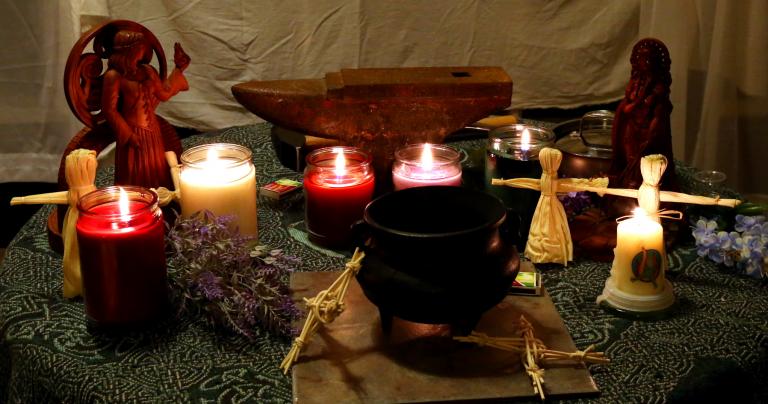I’m a Pagan and polytheist who does my best to keep my focus on Pagan and polytheist matters. At the same time, Christianity is still the 800 pound gorilla in Western culture – it’s impossible to ignore. And sometimes, what’s going on in the Christian world has relevance for Pagans as we try to build and rebuild our religions.
Last Monday, USA Today published an editorial by Oliver Thomas, a retired American Baptist minister. The title was American churches must reject literalism and admit we got it wrong on gay people. Thomas makes an argument promoted by moderate and liberal Christians for at least the past 150 years: the Bible is demonstrably not literally true, so Christians should stop using it to justify their hatred of gay people and the subjugation of women.
It’s difficult to watch good people (and the churches are full of them) buy into the sincere but misguided notion that being a faithful Christian means accepting everything the Bible teaches. We don’t impose the death penalty on adulterers, Sabbath breakers and rebellious children. Nor do we chase women from God’s house because they are menstruating or exclude men because of their physical handicaps.
Yet all of this, and more, is commanded by the Bible. The time has come for Christians to take a deep breath and ask themselves, “What does loving my neighbor — and my enemy — as myself look like?” And then proceed accordingly.
While this editorial is welcome, it is nothing earthshattering for Pagans, UUs, and many others. The reaction to it is another matter.
The Rev. Albert Mohler is President of Southern Theological Seminary, which is part of the fundamentalist Southern Baptist Convention. I read Rev. Mohler’s work on a semi-regular basis. I almost never agree with him, but he is intelligent and articulate. It’s interesting to watch the intellectual gymnastics he performs to maintain his belief in something that is clearly not true. His response is a textbook example of the Appeal to Tradition fallacy.
Thomas has denied the position of the believing Church since its inception — that the Scriptures are holy and stand as the inspired, authoritative Word of the living God. This is an explicit denial of sola Scriptura.
While liberal Protestantism does quite well grounded in the ethical teachings of Jesus and Catholicism has many deep roots (some of which are clearly pre-Christian), fundamentalist theology is entirely dependent on a literal interpretation of the Bible. Without it, it crumbles – as my own spiritual journey proves. Fundamentalists who are unwilling to question the doctrine of inerrancy – or who fear for their souls if they do – must go to great extremes to prop up their beliefs, including ignoring inconvenient passages. As Thomas says and anti-literalists continue to point out, there are many things the Bible says that no one follows.
But ignoring the Bible’s errors is one thing – actually admitting they are errors is another. The Bible clearly and unambiguously condones slavery. Of course it does – it was written in a place and time where slavery was fact of life. To his credit, Mohler does not use this to justify slavery. Instead, he says
Christians who pressed heroically for the end of slavery and the slave trade did not argue that the Bible was in error.
That statement requires ignoring traditional literal and contextual interpretations of scripture concerning slavery. Mohler is willing to reinterpret these passages, but not the passages condemning homosexuality. Charges of hypocrisy are among the weakest of arguments, but I don’t know how else to view this.
So, a fundamentalist is wrong – that’s not exactly news. What does this mean for Pagans?
All history has context and bias
In this era of Fox News, MSNBC, and Facebook, we understand (well, those of us who pay attention, anyway) that there’s no such thing as a completely objective, reliable source. Even when they present facts and not lies, getting the whole story depends on context and on thousands of other facts that are necessarily omitted from the report.
There is history in the Bible, but that’s not why it was written. Sacred stories have never been about facts – they’re about connections and values. And just as most political stories are written to persuade people to vote a certain way, the New Testament was written to persuade people to become Christians.
At the same time, facts are real. They may be complicated and they may be unpleasant, but we ignore them at our peril. If facts conflict with our beliefs, our beliefs must change – the facts aren’t changing.
The search for Truth is never finished
I understand the desire for Truth – what is good and right and real and does not change. This is rightly the responsibility of philosophy, not theology – and philosophy was invented by Pagans. The problem comes when we’re so sure we’ve found Truth that we stop looking.
There are many different schools of philosophy, just as there are many different religions. They have some areas of general agreement, but there is much about which, say, Stoics and Epicureans and Neoplatonists disagree. Who’s right? I propose that all of them have a piece of the Truth and none of them have the whole Truth.
If we keep working, we get progressively closer to the Truth, as when Christians came to the realization that slavery is wrong, no matter what the Bible says about it.
If we stop working, we can easily decide that since early Christians decided women were inferior to men and homosexuality is wrong, then that settles it forever. We may decide to take a historically accurate but ethically wrong view of human sacrifice. We may allow our legitimate desire for strong tribes to degenerate into racism and xenophobia.
Life is complicated and humans are flawed. No philosophy, no ethical code, and no theology is ever going to be perfectly correct. But we don’t have to be perfect. We just have to be better than we were.
Virtues and values – not rules – are our best guide to ethics
One of the roles religion plays in any society is setting guidelines for what is and isn’t acceptable behavior. The simple way to do that is with rules: thou shalt do this, thou shalt not do that. Rules mean you don’t have to think – that makes it easy.
The problem is that life is more complicated than even the most elaborate set of rules, and for every rule there is a legitimate exception that nobody thought about until it happened.
Rather than being bound by rules, it’s better to be guided by virtues and values. Virtues are qualities that over time have been shown to be helpful – things like reciprocity, hospitality, honesty, moderation, courage, justice, and kindness. In difficult situations, the question is not “what rule do I follow?” but “which virtues are applicable here?” and “how can I best embody them?”
Sometimes different virtues are in conflict, as anyone who’s ever tried to be both honest and kind knows. Most of us intuitively know that it’s usually better to be kind. We also know there are times – such as when a dear friend has a substance abuse problem – that have to be extremely honest.
Rules that may have made sense (or not) in an Iron Age society are hardly the best application of virtues in the contemporary world.
Honor the past – don’t worship the past
As a Pagan, honoring my ancestors is a major part of my religion. I’m inspired by their beliefs and practices, and I do my best to figure out what they did, why they did it, and how I can adapt their ways for my life here and now.
But there were things my ancestors did wrong. Maybe they knew it was wrong and they did it anyway. Maybe it was all they knew and they never thought to question it. I sometimes wonder what parts of my life people will look back on in a hundred or three hundred or three thousand years and say “I can’t believe he actually did that.” There will be something, that’s for sure.
Where our ancestors were virtuous, we should seek to emulate them. Where they were less so, we must do better.
Some Christians are doing better in accepting gay people.
And some aren’t.



















